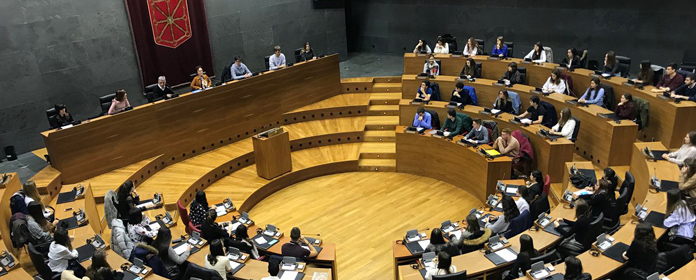The School of Education and Psychology present in the Parliament of Navarra.
Students from Degrees in Education Primary, Infant and Pedagogy attended the Parliament of Navarra where they discussed democracy and citizen participation in public life.

On February 21, students from Degrees in Education Primary, Infant and Pedagogy attended the Parliament of Navarra where they debated on democracy and citizen participation in public life, as internship of the subject "Theory of Education". This session was attended by parliamentarians Koldo Martínez, from Geroa Bai, and Nuria Medina, from the Socialist Party of Navarre (PSN), who took grade of the issues raised by student body.
The dynamic was divided into groups in which one person spoke for one minute from the speakers' rostrum. First, they talked about democracy, then about the keys to encourage civic participation in society, and finally about the impact that the work of university students has on the promotion of citizenship. This was followed by a discussion in which students addressed issues such as the disaffection of young people towards politics or the involvement of public institutions in different areas.
The president, professor and dean of the School of Education and Psychology Concepción Naval Durán had granted them one minute each and there were hardly any calls for attention.
But, are politicians prepared to give up their positions? Do they have a code of ethics to fulfill? The question was posed by a first year student of Education to the parliamentarian Koldo Martinez who moments before had boasted about the commitment of the political class with the citizenship. "All parties seek the common good even if we interpret it differently," he said.
It was in the turn of discussion, with the university students stripped of their notes, when it was clearly heard what worries them most and where the feeling of distrust towards the political class lies. Having overcome the traditional stage fright, "one of the difficulties of democracy", acknowledged Professor Silvia Zarraluqui, the university students began to light the fuse: Inés, María, Pablo, Manuel, Sara, Juan... "What can politicians do to get closer to us? It is important to educate by transmitting the truth, not ideologies. We have to create places for participation". There was no lack of voices of university students who, like María Paula Tapia, wanted to remember that taking subjects out of classroom as Education Civics had its political cost "because the participation of young people in the elections dropped several points". "The core topic to arouse participation is in people and in their Education but conditions are needed to favor it", summarized another of the professors attending the discussion.




